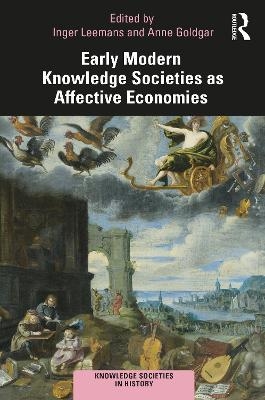
Early Modern Knowledge Societies as Affective Economies
Routledge (Verlag)
978-0-367-21996-3 (ISBN)
Early Modern Knowledge Societies as Affective Economies researches the development of knowledge economies in Early Modern Europe. Starting with the Southern and Northern Netherlands as important early hubs for marketing knowledge, it analyses knowledge economies in the dynamics of a globalizing world.
The book brings together scholars and perspectives from history, art history, material culture, book history, history of science and literature to analyse the relationship between knowledge and markets. How did knowledge grow into a marketable product? What knowledge about markets was available in this period, and how did it develop? By connecting these questions the authors show how knowledge markets operated, not only economically but also culturally, through communication and affect. Knowledge societies are analysed as affective communities, spaces and practices. Compelling case studies describe the role of emotions such as hope, ambition, desire, love, fascination, adventure and disappointment – on driving merchants, contractors and consumers to operate in the market of knowledge. In so doing, the book offers innovative perspectives on the development of knowledge markets and the valuation of knowledge.
Introducing the reader to different perspectives on how knowledge markets operated from both an economic and cultural perspective, this book will be of great use to students, graduates and scholars of early modern history, economic history, the history of emotions and the history of the Low Countries.
Inger Leemans is Professor of Cultural History at Vrije Universiteit Amsterdam, the Netherlands, and Principle Investigator of NL-Lab at the Humanities Cluster of the Royal Netherlands Academy of Arts and Sciences. She has published on the history of emotions and the senses, radical Enlightenment, financial crises and digital humanities. Her current project is on ‘Affective Economies. A Cultural History of Stock Trading’. Anne Goldgar is Garrett and Anne Van Hunnick Professor of European History at the University of Southern California. From 1993 to 2020 she taught at King’s College London, where she was Professor of Early Modern European History. She is a social and cultural historian who has written numerous works, including Impolite Learning: Conduct and Community in the Republic of Letters 1680–1750 and Tulipmania: Money, Honor, and Knowledge in the Dutch Golden Age.
Introduction: knowledge - market - affect: knowledge societies as affective economies Part 1: Wish economies and affective communities 1. Knowing the market: Hans Fugger’s affective economies 2. Pennetrek: Sir Balthazar Gerbier (1592-1663) and the calligraphic aesthetics of commercial empire 3. Affective projecting: mining and inland navigation in Braunschweig-Lüneburg 4. The secret of Amsterdam: politics, alchemy and the commodification of knowledge in the 17th century 5. Liefhebberij: a market sensibility 6. The shaping of young consumers in early modern book-objects: managing affects and markets by books for youths Part 2: Marketing and managing knowledge and affects 7. Marketing arctic knowledge: observation, publication, and affect in the 1630s 8. Coordination in early modern Dutch book markets: ‘always something new’ 9. The spectacle of dissection. early modern theatricality and anatomical frenzy 10. Rubbed, pricked, and boiled: coins as objects of inquiry in the Dutch Republic 11. The Amsterdam stock exchange as affective economy
| Erscheinungsdatum | 15.01.2021 |
|---|---|
| Reihe/Serie | Knowledge Societies in History |
| Zusatzinfo | 2 Tables, black and white; 2 Line drawings, black and white; 80 Halftones, black and white; 84 Illustrations, black and white |
| Verlagsort | London |
| Sprache | englisch |
| Maße | 156 x 234 mm |
| Gewicht | 660 g |
| Themenwelt | Geschichte ► Allgemeine Geschichte ► Neuzeit (bis 1918) |
| Geisteswissenschaften ► Geschichte ► Geschichtstheorie / Historik | |
| Geschichte ► Teilgebiete der Geschichte ► Wirtschaftsgeschichte | |
| Wirtschaft ► Volkswirtschaftslehre | |
| ISBN-10 | 0-367-21996-4 / 0367219964 |
| ISBN-13 | 978-0-367-21996-3 / 9780367219963 |
| Zustand | Neuware |
| Haben Sie eine Frage zum Produkt? |
aus dem Bereich


